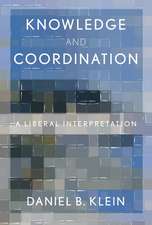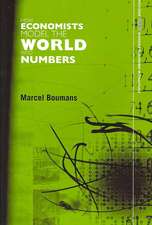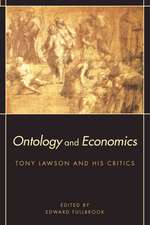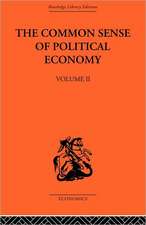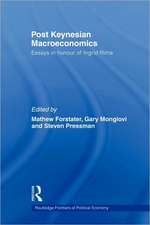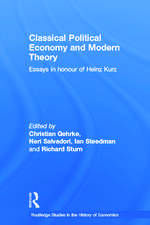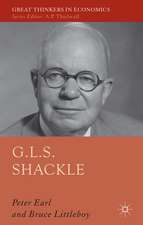Sraffa and Modern Economics, Volume II: Routledge Studies in the History of Economics
Autor Roberto Ciccone, Christian Gehrke, Gary Mongiovien Limba Engleză Hardback – 17 iun 2011
| Toate formatele și edițiile | Preț | Express |
|---|---|---|
| Paperback (1) | 469.34 lei 43-57 zile | |
| Taylor & Francis – 9 dec 2016 | 469.34 lei 43-57 zile | |
| Hardback (1) | 1123.68 lei 43-57 zile | |
| Taylor & Francis – 17 iun 2011 | 1123.68 lei 43-57 zile |
Din seria Routledge Studies in the History of Economics
-
 Preț: 370.72 lei
Preț: 370.72 lei -
 Preț: 294.95 lei
Preț: 294.95 lei - 8%
 Preț: 385.83 lei
Preț: 385.83 lei -
 Preț: 311.28 lei
Preț: 311.28 lei - 9%
 Preț: 934.73 lei
Preț: 934.73 lei -
 Preț: 665.68 lei
Preț: 665.68 lei - 9%
 Preț: 935.39 lei
Preț: 935.39 lei -
 Preț: 384.63 lei
Preț: 384.63 lei -
 Preț: 280.74 lei
Preț: 280.74 lei -
 Preț: 326.99 lei
Preț: 326.99 lei -
 Preț: 311.91 lei
Preț: 311.91 lei -
 Preț: 214.15 lei
Preț: 214.15 lei -
 Preț: 310.43 lei
Preț: 310.43 lei -
 Preț: 326.82 lei
Preț: 326.82 lei -
 Preț: 308.97 lei
Preț: 308.97 lei -
 Preț: 324.46 lei
Preț: 324.46 lei -
 Preț: 388.22 lei
Preț: 388.22 lei -
 Preț: 385.11 lei
Preț: 385.11 lei - 26%
 Preț: 850.91 lei
Preț: 850.91 lei - 25%
 Preț: 996.92 lei
Preț: 996.92 lei - 18%
 Preț: 1005.01 lei
Preț: 1005.01 lei - 18%
 Preț: 1002.60 lei
Preț: 1002.60 lei - 26%
 Preț: 1046.46 lei
Preț: 1046.46 lei - 18%
 Preț: 1280.31 lei
Preț: 1280.31 lei - 18%
 Preț: 1055.51 lei
Preț: 1055.51 lei - 18%
 Preț: 1058.43 lei
Preț: 1058.43 lei - 26%
 Preț: 987.72 lei
Preț: 987.72 lei - 25%
 Preț: 824.17 lei
Preț: 824.17 lei - 18%
 Preț: 1061.93 lei
Preț: 1061.93 lei - 18%
 Preț: 716.32 lei
Preț: 716.32 lei - 18%
 Preț: 1006.07 lei
Preț: 1006.07 lei - 18%
 Preț: 1069.92 lei
Preț: 1069.92 lei - 12%
 Preț: 342.67 lei
Preț: 342.67 lei - 26%
 Preț: 991.34 lei
Preț: 991.34 lei - 18%
 Preț: 1056.00 lei
Preț: 1056.00 lei - 18%
 Preț: 1076.53 lei
Preț: 1076.53 lei - 18%
 Preț: 698.08 lei
Preț: 698.08 lei - 22%
 Preț: 332.02 lei
Preț: 332.02 lei - 18%
 Preț: 1169.78 lei
Preț: 1169.78 lei - 18%
 Preț: 1059.84 lei
Preț: 1059.84 lei - 25%
 Preț: 852.88 lei
Preț: 852.88 lei - 25%
 Preț: 830.10 lei
Preț: 830.10 lei - 18%
 Preț: 1125.78 lei
Preț: 1125.78 lei - 18%
 Preț: 1062.98 lei
Preț: 1062.98 lei - 18%
 Preț: 847.96 lei
Preț: 847.96 lei - 18%
 Preț: 953.01 lei
Preț: 953.01 lei - 18%
 Preț: 1168.76 lei
Preț: 1168.76 lei
Preț: 1123.68 lei
Preț vechi: 1370.34 lei
-18% Nou
Puncte Express: 1686
Preț estimativ în valută:
215.04€ • 223.23$ • 179.31£
215.04€ • 223.23$ • 179.31£
Carte tipărită la comandă
Livrare economică 24 martie-07 aprilie
Preluare comenzi: 021 569.72.76
Specificații
ISBN-13: 9780415669351
ISBN-10: 0415669359
Pagini: 398
Ilustrații: 16 b/w images, 5 tables and 16 line drawings
Dimensiuni: 156 x 234 x 25 mm
Greutate: 0.87 kg
Ediția:1
Editura: Taylor & Francis
Colecția Routledge
Seria Routledge Studies in the History of Economics
Locul publicării:Oxford, United Kingdom
ISBN-10: 0415669359
Pagini: 398
Ilustrații: 16 b/w images, 5 tables and 16 line drawings
Dimensiuni: 156 x 234 x 25 mm
Greutate: 0.87 kg
Ediția:1
Editura: Taylor & Francis
Colecția Routledge
Seria Routledge Studies in the History of Economics
Locul publicării:Oxford, United Kingdom
Public țintă
Postgraduate and ProfessionalNotă biografică
Roberto Ciconne is Professor of Economics at Roma Tre University, Italy
Christian Gehrke is an Associate Professor of Economics a tthe University of Graz, Austria
Gary Mongiovi is an Associate Professor of Economics and Finance at St John's University, USA
Christian Gehrke is an Associate Professor of Economics a tthe University of Graz, Austria
Gary Mongiovi is an Associate Professor of Economics and Finance at St John's University, USA
Cuprins
Chapter III: Technical Change, Variable Returns and Normal Prices in the Classical Framework 1. Produced Quantities and Returns in sraffa's Theory of Normal Prices: Textual Evidence and Analytical Issues P. Ravagnani 2. Prices and Quantities: Possible Solutions within a Post-Classical Research Program F. D'Orlando 3. On Some Aspects of the Debate on the Gravitation of Market Prices to Long Period Prices F. Petri 4. Gravitation of Market Prices towards Natural Prices E. Belhino 5. Capacity Utilization, Mobility of Capital and the Classical Process of Gravitation R. Ciccone Chapter IV: Output and Distribution in the Long Run: A Classical Keynesian Perspective 1. Price or Quantities? The Common Link in the Methodds of Sraffa, Keynes and Kalecki A. Bhaduri 2. Notes on Sraffa and Keynes H. Bortis 3. The Capacity to Generate Investment: An Analysis of the Long-Term Determinants in Investment G. Bonfati 4. Steady State and the Analysis of Long-Run Tendencies: the Case of Neo-Kaleckian Models A. Trezzini 5. The Principle of Effective Demand according to Pasinetti B. Jossa 6. Monetary Influences on Distribution: A Comparison between Two Post-Keynesian Theories C. Fanico 7. The Quantity Equation and the Classical Theory of Production and Distribution E.J. Nell Chapter V: Applied and Policy Themes in the Reppraisal of Classical Economics 1. A Note about Effective Demand and Globalisation P. Leon 2. The Consequences of Sraffa for Economic and Social Policy Issues S. Cesaration 3. The Neoncardian Theory of Economic Integration G. Montara 4. On the Theory of the Balance-of-Payments-Constrained Growth A. Palumbo 5. On Facts and Theory: Some Reflections Prompted by the EMU Experience M. Privetti 6. Disinflation in Industrialized Countries, Foreign Debt Cycles and the Costs of Stability A. Ginzburg - A. Simonazzi 7. Capital Accumulation and Income Distribution in the US Economic Expansion of the Nineties V. Maffeo Chapter VI: Historical Issues in Sraffa's Writings 1. The Standard Commodity and Monetary Theory in the First Half of the Twentieth Century G. Fodor 2. Three Notes on Piero Sraffa's Early Economic Writings: 1920-1926 M. Naldi 3. New Material from Cambridge's Archive R. Bellofiore and J.P. Potter
Descriere
Exploring the relevance of Sraffa's thought for modern economics and written by an array of internationally respected contributors, this book is an invaluable tool for all those studying the history of economic thought.


